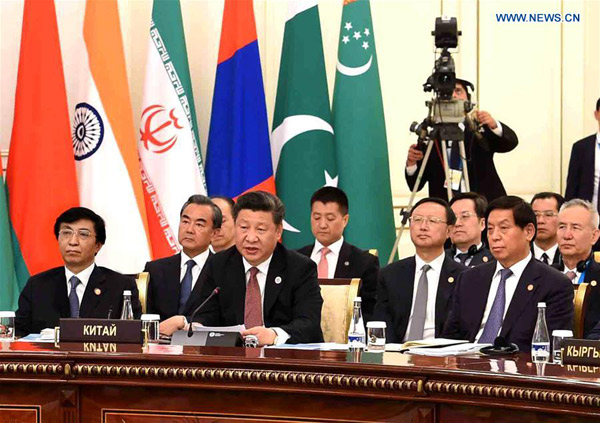Xi puts forward five-point proposal to consolidate, deepen SCO cooperation
(Xinhua) Updated: 2016-06-25 03:03
 |
|
Chinese President Xi Jinping (C front) attends the 16th Shanghai Cooperation Organization (SCO) Council of Heads of State meeting in Tashkent, Uzbekistan, June 24, 2016. [Photo/Xinhua] |
Thirdly, Xi proposed that the SCO should expand practical cooperation and find greater space for SCO development, expressing his hope that the organization will play an active role in aligning the Belt and Road Initiative and the other members' development strategies.
Fourthly, the SCO also needs to enhance culture and people-to-people foundation as the bridge for future development, Xi said, adding that China is willing to support other member states in restoring historical sites and archaeology studies, as well as communication and cooperation in such fields as youth, health care and environmental protection.
Last but not the least, the SCO should continue to uphold openness and inclusiveness and get more parties on board for SCO cooperation, Xi said. He also proposed that the member states take the process of accepting India and Pakistan as new members to enhance institutional building of the SCO and expand and deepen cooperation in various fields.
The annual summit, hosted by Uzbek President Islam Karimov, was also attended by Kazakh President Nursultan Nazarbayev, Kyrgyz President Almazbek Atambayev, Russian President Vladimir Putin and Tajik President Emomali Rahmon.
The SCO leaders agreed to remain committed to maintaining peace, boosting development and consolidating their relationship of equality and mutual trust, based on the principles of mutual respect, good-neighborliness and friendliness.
They pledged to deepen effective cooperation in wide-ranging areas and contribute to the security, stability and sustainable development in the region.
The leaders reaffirmed their support for the China-proposed Silk Road Economic Belt initiative and decided to take actions to continuously implement the initiative, thus promoting regional economic cooperation among the member states and integrating their respective development strategies.
The leaders said they will advance their cooperation in transportation infrastructure construction, push for the building of international transportation corridors and hubs that link Asia and Europe, and deepen cooperation in areas including economy and trade, industrial capacity, energy, investment, agriculture, culture, science and technology, and environment protection.




